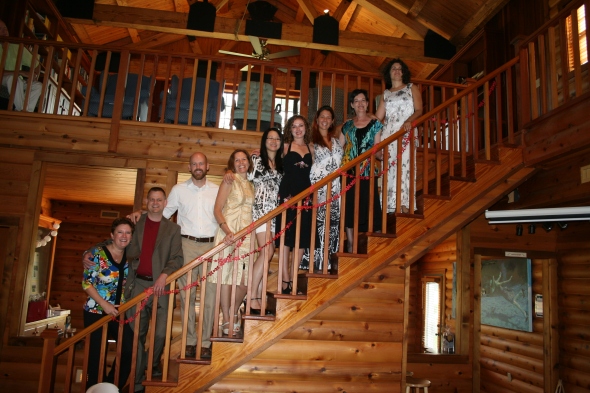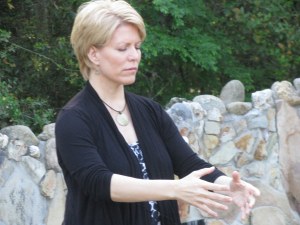Here’s to Not Worrying About the NCCAOM Exams
Posted: March 1, 2013 Filed under: Admissions Questions, Clinic, Student Life | Tags: acupuncture, five element acupuncture, NCCAOM exams Leave a comment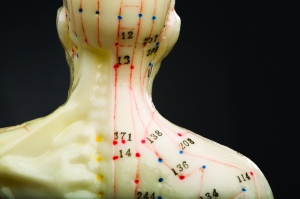 The interns seem to have arrived at THAT time of clinic. And I’m not talking about “senioritis.” I’m talking about that moment when the big hurdles of clinic have been conquered and the reality of life after clinic and school suddenly comes into focus. And what does that reality look like? BIG, SCARY BOARD EXAMS.
The interns seem to have arrived at THAT time of clinic. And I’m not talking about “senioritis.” I’m talking about that moment when the big hurdles of clinic have been conquered and the reality of life after clinic and school suddenly comes into focus. And what does that reality look like? BIG, SCARY BOARD EXAMS.
I don’t know exactly why it happens around this time. They’ve established a routine in clinic and seminar. Their first acupuncture patients are now ensconced in their care, referrals are coming in, they’ve begun treating new patients in the herb clinic. And yes, there’s still the final point location exam and the herbal studies final to contend with, but both are still months away. They should be able to relax into the routine. But each year, when the interns are just over the halfway point, someone rings the board exam alarm bell and the early nerves set in.
To be clear, many of the interns have completely relaxed into the flow of the clinical year. And no matter what they may be feeling internally, they’ve been trained to leave their anxieties at the clinic room door and focus on their patients’ needs. But on the academic side, we start to get peppered with questions about when they can take exams, how to study, and how other classes have fared. They’re already looking ahead to the next hurdle, sometimes forgetting that to be in the present moment is the best preparation for those exams. The more they learn from their patients and their teachers now, the better they’ll do.
Staying in the present moment is, of course, easier said than done. So I would like to sprinkle some good news into this mix of preparation and worry for the intern class, as well as for those prospective students who are already thinking that far ahead. I’ve written about the technical aspects of the NCCAOM exams before. For information on the exams themselves and how the Academy’s program prepares its students, please read Passing the NCCAOM Exams for some helpful suggestions and answers to the basic questions. The information there is still extremely current and relevant.
In the meantime, there is some additional information that I want to pass along to bolster everyone’s confidence. We get regular word from our graduates that they are passing their exams and getting licensed. It seems lately like each week brings another email about a recent graduate’s success story (the emails are usually filled with lots of exclamation points. I can practically see them jumping up and down). We’re very proud of all of them, and it tells the administration that our students are well-prepared once they graduate. I’ve heard so many prospective students tell me that the TCM schools they have visited tell them not to go to a Five Element school because we can’t prepare them to pass their national exams. I would like to officially negate that statement here. It’s simply untrue. If Five Element acupuncture is calling you, don’t let fear of an exam stand in your way. You will be ready.
I say this as a reminder to our current intern class as well. I know you don’t always feel like you know “enough.” But your patients are getting better. That isn’t luck, that’s YOU and your ability. Remember that your patients are your guides, and working with them in clinic is real knowledge. They are helping to prepare you for your exams, and for your practice after graduation. So when you start getting nervous or overwhelmed I encourage you to talk to your friends from the classes before you. They’ve either already navigated the process successfully, or are in the midst of it. While they are a huge source of information, they’re also a huge source of comfort. Remember the community that you are a part of. Remember that they are there for you when you need them.
I’m not saying that these exams are easy, or that everyone will breeze through them. You’re not supposed to. My point is that they’re not the insurmountable obstacle that they sometimes appear to be. The success of your upperclassmen is proof enough of that. So take your time, focus on what’s in front of you. There will be plenty of time for exam nerves AFTER you graduate.
“He who is not satisfied with himself will grow; he who is not sure of his own correctness will learn many things.”
Posted: January 8, 2013 Filed under: Admissions Questions, Student Life | Tags: acupuncture, acupuncture training, Beginner's Mind, five element acupuncture, Five Element theory Leave a comment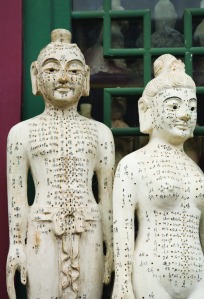 Yesterday we welcomed to newest cohort to Academy for Five Element Acupuncture. The winter class of 2016 began their first acupuncture intensive this week, starting Monday with a day of welcome and orientation. If you’ve been following our blog for awhile, you’ve read about (or maybe even experienced), the mixture of emotions that envelope staff, faculty and student alike. It’s a day of beginnings, of rememberings, of nerves, of joy. New people, new friends, and sometimes old friends or acquaintances finding themselves once again on the same path. It can be hard to settle into the nuts and bolts of orientation after the Opening Circle, but this cohort jumped right in and are well on their way as the newest members of the AFEA family.
Yesterday we welcomed to newest cohort to Academy for Five Element Acupuncture. The winter class of 2016 began their first acupuncture intensive this week, starting Monday with a day of welcome and orientation. If you’ve been following our blog for awhile, you’ve read about (or maybe even experienced), the mixture of emotions that envelope staff, faculty and student alike. It’s a day of beginnings, of rememberings, of nerves, of joy. New people, new friends, and sometimes old friends or acquaintances finding themselves once again on the same path. It can be hard to settle into the nuts and bolts of orientation after the Opening Circle, but this cohort jumped right in and are well on their way as the newest members of the AFEA family.
The class will now spend several days with senior faculty member, Gary Dolowich learning the fundamentals of Five Element theory. Even though Gary literally wrote one of the books on Five Element theory, some of this material may seem too introductory, too shallow for some. Some of it may feel redundant if they’ve been reading or studying on their own before they decided to commit to a program. In recent years I’ve seen a trend of students finding practitioners who will mentor them before they start school. But there are some questions that have to be deferred until later, some ends that won’t be tied up until clinic. The basics are essential in this tradition of acupuncture. So, while the dedication to learn as much as possible beforehand is impressive, I should point out that such preparation is not necessary to succeed. There are many traits that go into making a student’s time at the Academy successful, but I think clarity of purpose is actually more important that academic preparation. That sense of knowing that the Five Element way of life is your path helps ground students when life and school get complicated beyond that exciting first day.
Many of our students don’t spend years waiting to start their acupuncture training. Many choose to jump right in when that sense of purpose comes to them. And yet they’re in class next to the students who have previous knowledge. Those of you who haven’t been through the first intensive may ask yourselves how this works with differing levels of knowledge. There’s a reason everyone starts at the same point (many reasons actually), but there’s one in particular that needs to be stated here.
No matter where you’re starting, it’s important to find a way to stay in the Beginner’s Mind. To revel in the new information and way of seeing the world; to let go of preconceived notions and ideas, letting them inform but not hinder new discoveries. Staying in the Beginner’s Mind allows students a chance to acclimate, but more importantly it promotes openness. Those students who can’t revel in Beginner’s Mind often have a harder time remembering that the world of Chinese medicine is gray. Two seemingly opposite ideas can be true at the same time, which is a hard lesson to reconcile for our Western brains. Those who are more open can accept the simultaneity of opposites and realize that they don’t have to choose one practitioner’s version over another. Instead, they can file both versions away and determine which one might work better for the specific patient they are seeing.
So, I refer you now to the Chinese proverb in the title of this blog post. The cohort that began their training today will grow because they were not satisfied with their paths. They have chosen to grow. That was clear when they initiated the admissions process. But now, it’s important to remember the second part of the proverb: “he who is not sure of his own correctness will learn many things.” Remember that no matter how much preparation you have, you can never be sure of your own correctness. Stay open, stay in the Beginner’s Mind and you will learn many things. It all starts today.
Please join me in welcoming this newest group of acupuncture students to the AFEA community. We’re excited to watch your journey.
Skepticism vs. Compassion in Health Care
Posted: November 9, 2012 Filed under: Uncategorized | Tags: acupuncture, alternative health, five element acupuncture, health care Leave a comment The clinic at Academy for Five Element Acupuncture is thriving. This community isn’t spending much time worrying about how acupuncture works because they experience it firsthand, and then they share that experiences with others. Patients have questions in the beginning, they may be skeptical, but their conditions soon convince them to see for themselves what the talk is about. And then, all skepticism vanishes as they start to feel better after years of looking for relief through Western medicine that kept pushing them to take new pills. It’s a beautiful site to walk downstairs to the clinic reception desk and see patients hugging their interns after treatment. Everyone always looks so vibrant and rested when they leave.
The clinic at Academy for Five Element Acupuncture is thriving. This community isn’t spending much time worrying about how acupuncture works because they experience it firsthand, and then they share that experiences with others. Patients have questions in the beginning, they may be skeptical, but their conditions soon convince them to see for themselves what the talk is about. And then, all skepticism vanishes as they start to feel better after years of looking for relief through Western medicine that kept pushing them to take new pills. It’s a beautiful site to walk downstairs to the clinic reception desk and see patients hugging their interns after treatment. Everyone always looks so vibrant and rested when they leave.
Acupuncture has been continuously practiced for over 3,000 years. And yet skepticism persists in the Western world as to its efficacy, due mostly to its perceived lack of discernible cause. Clinical studies designed under the Western scientific framework have not been conclusive in finding out a biological explanation for how acupuncture works. As a result, many have dismissed positive outcomes as the placebo effect.
And yet, acupuncture is steadily gaining ground as a valid complement/alternative to traditional medical approaches regardless of what the scientific community reports. Why? Because too many people are experiencing results. They don’t necessarily need to know why or how. They feel better. Experience speaks louder than a controlled experiment in this case.
A lot of our patients come as referrals from family, friends, or other patients. These are trusted resources. But for those of you who haven’t had the pleasure of having your skepticism turned into curiosity, and that curiosity turned into an appointment, I’d like to share two recent articles with you.
The first article appeared in The Atlantic on September 11, 2012. Titled, “Biological Implausibility Aside, Acupuncture Works,” it was written by Lindsay Abrams. The article details a new study conducted by the Memorial Sloan-Kettering Cancer Center that studied the effectiveness of acupuncture for pain management. It included 18,000 patients and 29 randomized control groups. The results concluded that acupuncture was more effective than the controls in treating pain. Furthermore, “real” acupuncture was found to be more effective than “sham” acupuncture in treating pain (“real” acupuncture refers to practitioners needling acupuncture points, whereas “sham” acupuncture refers to when practitioners needle randomly on the body to simulate acupuncture). So, regardless of how it works, this study concluded that acupuncture is more than the placebo effect: it works.
The second article picks up where the first article leaves off, questioning why the Western scientific community remains so hostile and reluctant to admitting there’s more to acupuncture than they’ve been willing to allow. Written for the Huffington Post by Mark Schulman, president of Saybrook University, “What Acupuncture Can Teach Us About Science” questions that hostility. According to Schulman, that hostility stems from preconceived notions about science and biomechanics, as well as from the idea that “We don’t know how it works, therefore it must not.”
Schulman calls for an unleashing of the “scientific imagination” that he says gets strangled out of graduate students early on in their training. He says “there is still plenty of room for [the world] to surprise us.” Maybe it’s time for scientists to observe a little more closely what happens in a treatment room, and leave room for the fact that they may discover something completely outside of the standard paradigm. And maybe, maybe all of those studies linking the body and the mind aren’t so “alternative” after all.
Compassion and empathy are two qualities that science cannot afford to diminish in health care as they have been (those are “alternative” qualities). There is much to be said for a patient feeling cared for, heard and understood, in a word: believed. That’s part of the reason there’s hugging after appointments in our clinic. Patients appreciate the care they have received and there is trust between patient and intern.
As a new patient, I know I asked my intern dozens of questions about their thought process, point selection, what to expect, etc. I was intensely curious (and most likely a tad annoying). But now, I don’t ask questions. I let them work, and enjoy the fact that the health of my body, mind, and spirit are in capable hands. And I wish that experience for you, however you choose to find it.
Celebrating the Acupuncture Experience on National Acupuncture Day
Posted: October 24, 2012 Filed under: Five Element Acupuncture | Tags: acupuncture, five element acupuncture, health, National Acupuncture Day, well-being Leave a comment Happy National Acupuncture Day!
Happy National Acupuncture Day!
All across the country acupuncture clinics are celebrating the beauty and benefits of Chinese Medicine in different ways. A brief look at Facebook over the last few days showed me that our graduates are hard at work in their practices, using today’s celebration to promote health and awareness to new patients and current patients alike. They’re offering wonderful incentives to start treatment, or continue it, as well as plenty of educational information for those who aren’t quite sure they’re ready to (as one alum put it) “take a stab at it.” For those of you not linked in on Facebook, you can search for events on www.aom.org, or search generally for practitioners in your area.
This day is about promoting awareness of the health benefits that acupuncture provides. But I’m not going to rattle off a list of ailments and conditions that acupuncture successfully treats. I will leave that to the AFEA website and the other practitioners offering educational sessions today. In the end, people choose acupuncture treatment because they know someone who has experienced it, and they have seen their friends or family members healthier as a result of treatment. There’s no better recommendation than a real life success story, particularly from someone you know and love.
So in this vein of contributing to the awareness raising efforts of National Acupuncture Day, I am inviting my readers to share their most memorable experiences of acupuncture treatment, why they went in the first place, what benefits they saw, what changes occurred, etc. Our students come to the Academy mostly because they’ve witnessed first-hand the healing power of acupuncture. Their stories are nothing short of miraculous (hence the desire to become a practitioner). But you don’t have to want to be an acupuncturist to have had your health positively impacted by acupuncture. And so, to start things off, I’d like to share with you one of my most memorable acupuncture treatments and how the effects rippled out to the rest of my life.
I should state that I’ve had many treatments that stand out in my memory. They stand out for different reasons too, but my most memorable treatment doesn’t come from the alleviation of a physical symptom. It comes from the emotional/psychological affects of the treatment, borne out by needles, points, and the relationship I had with my practitioner.
At the particular stage of treatment in general, my practitioner and I were addressing the pervasive fatigue that kept coming back and managing my anxiety. I seemed to be tired all of the time, and there was no “real” reason that I could come up with. I just felt like I had hit a very frustrating, and very familiar wall in my life. I went in for an herb follow-up appointment to see what adjustments might be needed to my formula. Upon checking my pulses, the clinic supervisor that day consulted with my intern practitioner about the Husband & Wife block that she had detected. This is a rather serious block to the movement of qi (I’ll let you research that if you need more information). Suffice it to say, it was big enough for the supervisor to let my practitioner treat the block during my herb appointment rather than have me wait for an appointment in the acupuncture clinic the following Monday.
This wasn’t one of the treatments where I remember the exact physical sensations of each needled point. It was an overall whoosh, like a pin ball had been shot through me and was able to move without impediment. There was a balancing sensation as energy moved and debris was cleared out. So much fell away by the end of the treatment: the anxiety, the fear, the extreme sense of lethargy and lack of purpose that always seemed to dog me. And yet, at the same time, it wasn’t a blinding eureka! moment. It was more like waking up, alert, from sleep and being able to see without a veil. And I realized my practitioner was talking to me. When I tuned in I heard her say, “I really think you’re at a crossroads here where you can take control of which path you take. You have the ability to choose.” And for the first time in my life, I actually was able to choose my path instead of letting circumstances and old patterns choose it for me. Decisions suddenly felt solid, without the lingering what if. I didn’t need to keep looking backwards anymore.
My practitioner didn’t break the energetic block in my body with just needles. It was her knowledge and understanding of me as a person, as my own unique self, and the partnership that we had built that enabled me to go back to my life and make sweeping changes to habits, routines, and my life’s direction. Without that partnership, I don’t believe the treatment would have been as powerful as it was. Five Element students and practitioners spend a lot of time learning how to build rapport with their patients. And this treatment was a telling instance of how important that work is.
I could tell you that my migraines became almost non-existent through acupuncture. I could tell you that my allergies are better managed, that I no longer have knee pain keeping me from running, and that I sleep without interruption for the first time since high school. There are plenty of physical ailments that I have treated with acupuncture. And while those issues were impediments to daily life, there was no greater impediment to living my life than my emotional and spiritual being. These aspects of ourselves shouldn’t be discounted as just being “in our heads.” You don’t always have to throw pills at anxiety and depression. There are other options.
So, please join us as we celebrate National Acupuncture Day. I invite and encourage those of you who have had acupuncture to share your stories with friends, family members, or even strangers you happen to be chatting to. You never know how your experience might help heal someone else. And if you’re in the Gainesville area, come join us at the Downtown Farmer’s Market. See you there!
Abundant Splendor
Posted: September 27, 2012 Filed under: Five Element Acupuncture, Student Life | Tags: abundant splendor, acupuncture practice, commencement, five element acupuncture Leave a commentAnother busy month has passed at Academy for Five Element Acupuncture. We sent a new class of acupuncture practitioners out into the world at the beginning of September. In a ceremony full of late summer/early fall imagery, students, faculty, and family gathered to celebrate the joyous occasion.
While the students in Class 27 stood out for many reasons, I’d like to highlight the new tradition that they started for clinic classes. At the retreat at the beginning of their clinical year, they chose the Earth point, “Abundant Splendor” as their class name as a way of expressing the spirit of their class. They chose it because it illustrated the ability to both give and receive support; and they used it as a guiding point throughout the hectic clinical year. As a result of their commitment to this principle of working together fairly and supporting each other’s efforts both in clinic and outside of clinic, their class was the fastest class to finish their clinical requirements. There are always a few interns who finish ahead of their colleagues, but Class 27 was the first where everyone finished ahead of schedule. They were able to do that because of their commitment to each other, and their embodiment of the essence of Abundant Splendor. To paraphrase their class representative in her Commencement speech, “You stood together, giving and receiving equally, all the while holding the center with integrity.” Congratulations everyone! You will be missed.
I am commemorating this now, publicly and after the fact, because September is an odd time for a Commencement ceremony. September brings about the change from late summer to fall. We’re moving into the end of the year and the transition between these two seasons usually has us feeling melancholy and nostalgic, not celebratory. But if we look at this time of year from the Five Element perspective, it makes perfect sense. Late summer represents the harvest, the cultivation of the growth of summer. The very air is heavy with abundance (particularly in Gainesville). Flowers have become fruit, and fruit and grains are being collected and tilled. It is a time to reap what one has sowed. In this case, the graduates saw the hard work of the last three years bear fruit in the completion of their Master of Acupuncture degrees.
And as we pass into the early fall season, the air starts to cool and you can start to smell the slight tang of decay in the air. It’s a time of letting go, of honoring the past and looking ahead to the future. It is the season of the Metal element. The graduates don’t have an immense amount of time to reflect on their achievements. They’re busy studying for their NCCAOM exams and finding office space for their acupuncture practices. Even the faculty and administration haven’t had long to reflect, as Class 29 arrived on Class 27’s coat tails for the beginning of their second year, and Class 28 began seeing their patients in the clinic. But a Commencement ceremony in September allowed all of us time to reflect and cultivate the joy of achievement. There was an immense amount of pride demonstrated through the tears and moments of speechlessness in the ceremony. And while we were letting go of one class, remembering them for all that they brought to the AFEA community and family these last three years, the ceremony also allowed us to honor their legacy as we prepared to move forward into the fall.
I can’t think of a better time of year for a Commencement ceremony.
So, to Class 27, though you have scattered to your respective corners of the country, I would like to remind you one more time how proud we are of you. You are an inspiration to your fellow classmates and to the classes living in your wake. May you continue to flourish under the guiding influence of Abundant Splendor.
The Heart of the Matter
Posted: July 23, 2012 Filed under: Admissions Questions, Five Element Acupuncture, Student Life | Tags: cultivating the heart, education, five element acupuncture, health and well-being, heart 2 Comments“What is heart disease?”
One of our interns wrote this question on the library white board recently, with a website written below it to help their fellow classmates find answers. While the website and the question dealt with the physical aspects of heart disease, the question called to mind a conversation that I had just had with our Director that put the question of heart disease in a very different light.
Misti and I had been talking about making sure that prospective students and applicants had as much information about our program as possible. We want to make sure students know who we are and what we expect of them. This is a seemingly obvious objective. But as more students find us online, without a reference for the differences between TCM and Five Element Acupuncture, we’re realizing how important it is for prospective students of Academy for Five Element Acupuncture to understand the heart of our program. And what it means when we say that our curriculum seeks to “cultivate the heart.”
Most prospective students don’t think about cultivating their hearts as being part of their formal education. As a society, we’ve come to an understanding that self-awareness and learning about one’s self is a by-product of going to school, not the goal. The lessons we learn about ourselves come from the social interactions with our colleagues, or from the internal struggles we have understanding the material at hand. Private, individual struggles that don’t belong in the classroom. We only talk about them in order to explain a late homework assignment, or a missed class. They are asides, excuses, of note only to the individual. One might say we deny these experiences because they are not part of the rational, analytic processes that the classroom requires. In this sense, we deny the heart.
This ignorance, or denial, of the heart is another form of heart disease. When we repress what our heart of hearts is telling us, it impacts our emotional health and well-being. Most of us change careers because we’re tired of doing something that “isn’t me.” We want satisfaction and purpose from our work. Without it, we become stressed, anxious, or depressed. The physical symptoms follow.
At AFEA, we don’t believe that the cultivation of the self, of the heart, is a by-product of education. We believe this is fundamental to the process of becoming a practitioner. The student’s inner development is placed in the forefront of the education they receive, with an important emphasis on increasing awareness of one’s internal state. Through reading, Qigong, meditation, and field trips into nature, students are asked to look within and learn who they are as individuals, and as practitioners. We ask students to evaluate themselves, identifying their areas of strength and weakness in an order to help them grow past their limitations and the fears that might be holding them back. Only when the practitioner is able to focus their intention, can they be effective. And only when there is stillness inside, can they focus their intention.
So, we seek to strengthen the heart, the individuality, compassion, empathy, and awareness of the student as practitioner. We work to provide a safe space for students to do this inner work, so that they in turn can create a safe place for their patients. Inner development of the practitioner is all about “healing the healer.”
I’ve read many an essay from applicants who are seeking this form of education. They want more than the memorization of points, patterns, and meridians. They came to Chinese medicine because it was supposed to treat patients as a whole being. Our program treats the student as whole beings.
I’m betting that you have a list of criteria you’re working from in order to find the right program, and I bet it includes things like location, length of program, and cost. Your list might also include faculty members, national exam pass rates and job placement. You should ask school representatives about all of those aspects. Some of you may not need to go farther than those categories. What I have described above may be more than what you’re looking for. We get that, which is why I’m hoping that this information will help you find where you belong. But for those of you needing more, don’t forget to ask if there is heart in the program. Will it nurture and support you? Will it help you grow into the practitioner you’ve been envisioning?
Those are harder questions to answer. And so I encourage you to visit the schools you’re interested in and talk to current students. Doing that little bit of extra research will help you find the place you’re looking for.
Explaining Corequisite Coursework
Posted: June 29, 2012 Filed under: Admissions Questions | Tags: academic planning, acupuncture school, corequisite courses, five element acupuncture Leave a comment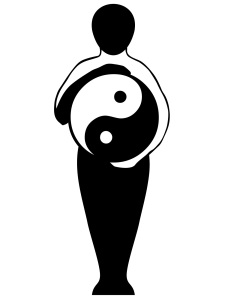 It’s time to address some more of the big admissions questions. For those of you who are applying or are trying to choose an acupuncture school, this post is directed to you.
It’s time to address some more of the big admissions questions. For those of you who are applying or are trying to choose an acupuncture school, this post is directed to you.
There are two very commonly asked questions that students interested in Academy for Five Element Acupuncture ask me: how does the intensive schedule work and what are corequisites? While I’ve addressed the intensive structure in another post, these two questions are actually related. Allow me to explain, and in the process, answer this perennial question.
First and foremost, corequisites are western science courses that are required for graduation but are not taught at the Academy. These courses are: Anatomy & Physiology II, General Nutrition, and three Biomedical Electives. The intensive schedule is already jam-packed with the study of Five Element Acupuncture theory, technique and practice. An intensive session is meant to be an immersive experience focused on developing one’s senses, learning the location of acupuncture points, as well as the spirit of those points and how to put them together in a treatment plan. As a result, there are courses that we cannot fit into the intensive schedule.
So how do our students complete these classes? There are two options: (1) Students can transfer credit for these courses from previous coursework or (2) Students complete them concurrently with their acupuncture coursework at outside institutions.
Many students have already taken one or two of the corequisite courses as part of their Bachelor’s and Master’s degree programs. So, those students transfer that credit to our program and do not have to repeat those classes (I don’t know anyone who wasn’t excited about not having to retake A&P II). Transfer credits need to be from an accredited institution and have been completed within the last 15 years. And being able to transfer previous coursework means that those students can focus solely on their acupuncture training. This prospect means that some students actually decide to complete all of their corequisites first, and then apply to our program. It’s a reasonable choice, but it’s important to keep in mind that corequisites are different from pre-requisites. They do NOT have to completed before enrollment.
For those students who want to forge ahead and get started, they can complete their remaining corequisites while they are simultaneously enrolled at the Academy. It might sound like a lot to juggle, but most students choose online courses to meet their corequisite requirements. The flexibility of the intensive structure and online course offerings make completing corequisite courses easier and integrative. Online classes are accepted as transfer credit provided again that the institution offering the courses is properly accredited and the student has gone through the course approval process.
Completing corequisites concurrently with acupuncture coursework is very doable, provided that students have a plan. Students receive their transcript evaluation during the admissions process, so they know from the first day where they stand. I then meet with each student individually during the first intensive, and then throughout the successive intensives, to determine a time-frame of when to take these classes. We readjust as life and other responsibilities make it necessary. I also have a list of online programs and other community colleges where students can take classes. So students are not on their own when it comes to figuring out what to take and where.
The overwhelming majority of students transfer in at least one or two corequisite classes when they start. And for those who have more classes to take, I work with them to tailor those classes to their future interests as acupuncture practitioners. So this process isn’t one to get too worried about once you know what it is all about. The key is planning from the very beginning, and remembering that there is support in the planning process.
Are you curious about how your credits might transfer? Are you unsure of what you’ve already completed? Please don’t hesitate to contact me with all of your questions.
Summertime Thanks for an Amazing Year
Posted: June 22, 2012 Filed under: Student Life | Tags: Academy for Five Element Acupuncture, acupuncture, blog anniversary, five element acupuncture, NCCAOM exams Leave a comment We celebrated the Summer Solstice this week at Academy for Five Element Acupuncture. According to the laws of nature, summer has officially begun, ushering in the season of the Fire element. And so we celebrate the warmth, the joy, and the connections that summer and fire represent. Additionally, we are also celebrating our one year blog anniversary.
We celebrated the Summer Solstice this week at Academy for Five Element Acupuncture. According to the laws of nature, summer has officially begun, ushering in the season of the Fire element. And so we celebrate the warmth, the joy, and the connections that summer and fire represent. Additionally, we are also celebrating our one year blog anniversary.
When I first started posting at this time last year, the Academy was preparing for Class 24/25’s commencement. I’m happy to report that the members of that class have passed their board exams and have started their practices. It’s hard to believe that it’s only been a year since they were here, treating and studying. Now, they’re treating patients all over the country, ranging from Florida to Kentucky, to New Mexico and Alaska. Oh the places that Five Element Acupuncture will take you.
And in the past year, Class 26 has also graduated. They’re in the midst of passing their NCCAOM exams. Yes, I have heard from many corners of the country that the members of Class 26 are passing their exams on the first take. A few are already in practice. If you’re reading this and asking yourself how long it takes to start practicing after graduation, take this to heart: it can take as little as three months to pass your exams, apply for your license, and start treating on your own. While that’s the fast track, it is possible. I’m adding to the celebration list the inclusion of newly licensed Five Element Acupuncturists. The medicine is spreading and reaching more people. That is something to celebrate indeed.
We’re also celebrating Class 27’s Third Year point location. I am happy to say it is the last test I will have to proctor for them. They did an amazing job, even through their nerves!
To round out the list, Class 28 finished Year Two, Class 29 finished Year One and started the Chinese Herbal Studies program.
It has been a busy year. I want to take the opportunity to congratulate all of our students for their accomplishments this year. As an administrator, it’s a pleasure to support the goals of our students. I also want to take the opportunity to thank my colleagues in the administration for their support as this blog got off the ground, and for their consistent efforts in developing our acupuncture and herbal studies programs. We may not all be acupuncturists, but we believe in what we’re doing.
And so, at the sun’s high point, I offer thanks to everyone whom I have had the pleasure of working with this past year. May our paths cross again soon and often.
Spring Has Sprung at AFEA
Posted: April 26, 2012 Filed under: Student Life | Tags: five element acupuncture, inner growth, qigong, Rainbow River, reflection Leave a comment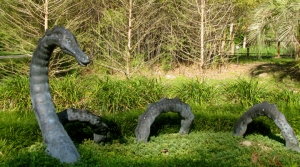 All across the country we’ve been experiencing the abnormal weather patterns. Here in Gainesville, we hit 90 degrees in early March and stayed there most of the month. Since April dawned, though, the humidity has dried up and we’ve been in the low 80s, high 70s. In some ways, it was the “winter” we never had! And while we desperately needed some rain to counteract the drought we’ve been experiencing, our classes have taken full advantage of the dry weather to deepen their understanding of Five Element theory through time in nature.
All across the country we’ve been experiencing the abnormal weather patterns. Here in Gainesville, we hit 90 degrees in early March and stayed there most of the month. Since April dawned, though, the humidity has dried up and we’ve been in the low 80s, high 70s. In some ways, it was the “winter” we never had! And while we desperately needed some rain to counteract the drought we’ve been experiencing, our classes have taken full advantage of the dry weather to deepen their understanding of Five Element theory through time in nature.
An important part of our curriculum is a course called Inner Development of the Practitioner, where the primary focus is on the individual practitioner. The course asks students to measure their own strengths and areas for growth, as well as finding ways to nourish that growth. The healer must have ways of healing the self before working to heal others. One of the ways that we help our students achieve these inner goals is to take them into nature, to observe, to reflect, and to link what they’re learning in the classroom to nature and their own selves. Here are some of the highlights from the last few months:
Class 27 took a day off from their busy clinic schedules to explore the Kanapaha Botanical Gardens (a short drive from the Academy) and practice a little qigong.
Executive Director, Misti Oxford-Pickeral leads the early morning qigong.
Class 27 qigong in the Children’s Garden at Kanapaha Botanical Gardens
Meanwhile, Class 29B, here for their second intensive in March, headed onto the Rainbow River for a little time in nature.
Class members from Class 29B paddle down the Rainbow River
Isn’t the water just gorgeous? The Rainbow River is a beautiful place to contemplate the Wood and Water elements right now.
The Rainbow River on a sunny day in March, 2012.
So, while our students have been meditating on the water and out in the garden, what have you been doing to nourish yourself? Have you been out and moving with the springtime energy? I wish you all a happy springtime.
What Makes Five Element Acupuncture Memorable?
Posted: March 23, 2012 Filed under: Five Element Acupuncture | Tags: acupuncture, acupuncture points, acupuncture students, five element acupuncture, interns, practitioner, well-being Leave a comment Our Twitter feed this week asked the following question: “What was your most memorable acupuncture treatment?” I had to sit with this question for a bit to think about my most memorable treatment, and then after awhile I realized that not only were there just too many to pick one, the reasons they were memorable were too different.
Our Twitter feed this week asked the following question: “What was your most memorable acupuncture treatment?” I had to sit with this question for a bit to think about my most memorable treatment, and then after awhile I realized that not only were there just too many to pick one, the reasons they were memorable were too different.
Some of my treatments have provoked immediate responses. For instance, there was my first treatment, where they were testing to see if I was a Fire CF. When my student practitioner needled the points at my wrist it felt like a burst of bubbles rushed into my hands, kind of like how Alka-Seltzer feels when you drink it. I was so moved that I actually started singing the commercial jingle. Then, I starting laughing so hard that I couldn’t stop. I made the supervisor on duty and my intern start laughing, until they realized I couldn’t stop. When I finally calmed down, there was an amazing sense of sadness underneath the laughter. Sadness I hadn’t been able to acknowledge and wouldn’t have been able to without the laughter (or the treatment). I don’t know if it’s the laughter or the sadness that I remember most. But it was definitely a memorable treatment.
Other treatments were memorable because of specific points. The first time I had points on my feet needled definitely stands out. Foot points are, well, more tender, but it wasn’t the tenderness that I remember, it was the strength of the energy that rushed through my feet as a result. The power took my breath away. Then there was the first time I had the point “Amidst Elegance” needled. I felt my own strength and a clearly defined sense of self. I don’t think I’ve ever been able to sit up that straight and that calmly before. And then, I remember going in one day and talking about a need for balance. They needled a point called “Equilibrium Middle,” which is located behind the knee. I remember thinking, “All that time I’ve spent seeking balance and it’s been behind my knee the whole time. ” Everyone in the room got a kick out of that escaping thought.
Perhaps the most memorable points have been points needled on my head. It’s like being transported through and into the universe. I don’t know where I go, but I try to hold onto the sensation and guide myself back to it in times of stress. I have known for awhile that acupuncture was helping me feel better, but I don’t think I fully recognized how powerful just a few acupuncture points could be until I had head points needled.
In the end, it doesn’t seem to be about one treatment or one point. Particularly with Five Element Acupuncture, the succession and progression of treatments is the key to achieving balance and health. The immediate sensations are wonderful, but the changes that occur and that become possible because of the movement of energy are more important. In my mind, none of this would be possible without a deep sense of trust between the patient and the practitioner. If you don’t trust your practitioner, you won’t go back. And the rapport between patient and practitioner is essential in being able to get at the root of the problem. Those of you already being treated know this. Those of you being treated in our student clinic know how amazingly supportive and sacred the clinic space is, how our interns and supervisors focus their intentions so carefully on you.
And so, if I was really forced to pick a most memorable treatment, it would actually have to be my TD, the two-hour Traditional Diagnosis. That’s right, my intake, where there were no needles, no points, just me and my practitioner, talking about my health and my life. I’d never felt so heard in my life by a medical professional. More than anything, that moment stands out because it was the beginning of an amazing journey towards health and well-being.
So, I’m going to rephrase our Twitter question and turn it back to you: what makes acupuncture memorable for you? Is it your practitioner, the immediate sensations, the way you feel three weeks later, the names of the points? If you tell me that it’s all of the above, maybe you should consider becoming a practitioner.

